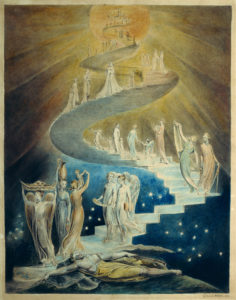Thoughts on Sunday’s Lessons for July 23, 2017

Jacob’s Dream (1805), pen and ink and water color drawing by William Blake (1757-1827). The British Museum, London.
Signals of God’s abundant love as the gift of grace shine through Sunday’s readings. Consider Jacob, for example: A conniving trickster, in the verses preceding this reading he cheated his brother, his father, and his father-in-law for everything he could get. Now Jacob is on the run, fearing that his angry twin Esau is going to kill him. Sleeping in the desert on a stone pillow, Jacob has a remarkable dream of angels going up and down a celestial ladder. And then he hears God’s voice, repeating the promise given to his grandfather Abraham and his father Isaac: God is with him, and his offspring will fill the Earth. Why would God reward such a sneaky cheater? God knows that no human is perfect, but God still loves and protects even such broken, troubled people.
First Reading (Track Two): Isaiah 44:6-8
This short, poetic prayer of praise within Isaiah’s prophecy assures the people that they will return home to Jerusalem from their exile in Babylon. The prophet imagines God declaring God’s own power and majesty. Despite the beliefs that their captors may hold in other gods and other prophesies, Isaiah makes clear that Israel need not fear or be afraid. God is not only the nation’s redeemer and leader, but the first and last of all creation, beside whom there is no other god.
Psalm (Track One): Psalm 139: 1-11, 22-23
If Jacob had a moment of introspection and examined his conscience, he might have lain awake on that desert night, fearing Esau’s revenge and praying something like this psalm. Even if we run from God, we cannot hide from God. In heaven or in the grave, in darkness or in light, up in the sunrise sky or down in the deepest part of the sea, no matter where we go or how we try to hide, God knows where we are and what we are thinking. Even when we are wicked, God will lead us in right paths.
Alternative to the Psalm (Track One): Wisdom of Solomon 12:13, 16-19
The Wisdom of Solomon, a short book in the Apocrypha, was written in King Solomon’s name not long before, or even possibly during or after, the time of Jesus and the evangelists. These verses seem to echo the faith of Psalm 139 in their ringing praise for a powerful, righteous God who reigns over all creation, yet judges the people mildly and with forbearance, teaching us that to be righteous requires us to be kind.
Psalm (Track Two): Psalm 86:11-17
The Psalmist is grateful for God’s abundant love shown in protection against the violence and threats of enemies. Like the people in exile in today’s reading from Isaiah, he faces difficulties – even being trapped in the “nethermost Pit” and pursued by a band of violent men. Nevertheless he turns to God with faith and trust, calling on God to respond out of grace and compassion, kindness and truth, to turn to him and have mercy, shaming his foes with a sign of God’s favor.
Second Reading: Romans 8:12-25
As we go through Paul’s letter to the Romans this summer, you’ve probably noticed that he sticks with consistent terms, repeatedly contrasting death in the flesh against life in the spirit of Christ. He emphasizes these points again in today’s reading: If we live by our own selfish desires, we die. But if we live in the Spirit through Christ, loving God and our neighbor even as we suffer with Christ, we are glorified with him and become beloved children of God.
Gospel: Matthew 13:24-30, 36-43
Following immediately upon last week’s Gospel about the sower and the soil, we meet another sower in another of Jesus’ parables as told by Matthew. This time the soil is good, and so is the seed. The sower is planting wheat in the rich soil of his own field, only to have an enemy sneak in at night and plant weeds among the good wheat. He can’t uproot the weeds without disturbing the wheat, so they must grow together until harvest, when the weeds can finally be torn out and discarded. Jesus’ explanation may sound a bit disturbing with its talk of hellfire and damnation for the weeds; but it’s clear that those who live righteously will enjoy God’s kingdom.
What are “Track 1” and “Track 2”?
During the long green season after Pentecost, there are two tracks (or strands) each week for Old Testament readings. Within each track, there is a Psalm chosen to accompany the particular lesson.
The Revised Common Lectionary allows us to make use of either of these tracks, but once a track has been selected, it should be followed through to the end of the Pentecost season, rather than jumping back and forth between the two strands.
For more information from LectionaryPage.net, click here.
